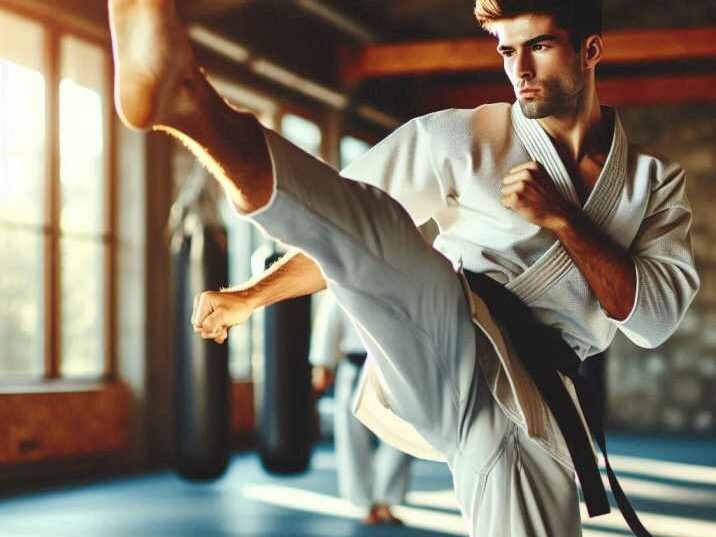Martial arts are more than just a way to defend yourself—they offer numerous benefits that go beyond physical skills. In this article, we’ll explore the valuable lessons can that martial arts teach you, from developing self-discipline to understanding respect and teamwork. We’ll also look at how martial arts can impact your life in various positive ways.

Introduction
Table of Contents
Martial arts are ancient practices that involve physical training, mental discipline, and moral teachings. They include various forms such as karate, judo, taekwondo, and Brazilian Jiu-Jitsu. Each martial art has its unique techniques and philosophies, but they all share common values that can benefit practitioners in numerous aspects of life.
Whether you’re a beginner or an experienced martial artist, the lessons you learn on the mat can influence your daily life in meaningful ways. In this article, we’ll break down what martial arts teach you, how these lessons can be applied outside of training, and why these skills are valuable for everyone, especially young learners.
What Martial Arts Teach You
Self-Discipline
One of the most important lessons martial arts teach is self-discipline. Training in martial arts requires you to practice regularly, follow instructions, and improve your skills over time. This discipline helps you stay focused and dedicated, not only in martial arts but in other areas of your life as well.
Example: In karate, you learn to follow strict forms and routines. This repetition helps you build good habits and a strong work ethic.
Respect
Respect is a fundamental value in martial arts. From bowing to your instructor to showing courtesy to fellow students, respect is deeply ingrained in martial arts practice. This value teaches you to appreciate the effort and skills of others while understanding the importance of humility.
Example: In judo, showing respect to your opponent before and after a match is essential, reflecting good sportsmanship and mutual regard.
Confidence
Martial arts can significantly boost your confidence. As you learn new techniques and improve your skills, you gain a sense of accomplishment. This newfound confidence helps you tackle challenges in other areas of your life, whether it’s at school or home.
Example: Achieving a new belt rank in taekwondo gives you a sense of achievement, which can make you more confident in your abilities.
Patience
Practicing martial arts teaches you patience. Progress in martial arts often comes slowly, requiring consistent effort and practice. This patience can translate into other aspects of life, helping you deal with situations that require time and perseverance.
Example: Learning complex moves in Brazilian Jiu-Jitsu can take weeks or even months, teaching you to be patient and persistent.
Physical Fitness
Martial arts provide an excellent workout, enhancing your physical fitness. Training involves various exercises that improve your strength, flexibility, and endurance. Regular practice can lead to better overall health and a more active lifestyle.
Example: Kickboxing routines can help you build muscle, increase cardiovascular fitness, and improve coordination.
Conflict Resolution
Martial arts also teach conflict resolution skills. Although martial arts involve fighting techniques, they emphasize resolving conflicts peacefully and understanding when to use physical skills and when to avoid confrontation.
Example: In aikido, the focus is on using an opponent’s force against them, demonstrating how to handle conflicts without aggression.
Table of Information
| Lesson Taught | Description | Benefits |
|---|---|---|
| Self-Discipline | Learning to control your actions and emotions. | Improved focus, better behavior, and persistence. |
| Respect | Showing respect for instructors, peers, and opponents. | Stronger relationships and better teamwork. |
| Confidence | Building self-esteem through skill development. | Increased self-assurance and courage. |
| Patience | Developing the ability to wait and practice consistently. | Enhanced perseverance and less frustration. |
| Physical Fitness | Improving strength, flexibility, and endurance. | Better health and physical condition. |
| Conflict Resolution | Learning to handle conflicts without violence. | Better problem-solving and communication skills. |
Conclusion
Martial arts are more than just physical training; they offer valuable life lessons that can enhance your personal development. From building self-discipline and confidence to learning respect and patience, the skills gained through martial arts practice are beneficial both on and off the mat. Embracing these lessons can lead to a more balanced and fulfilling life.

FAQs
- What are the main benefits of martial arts for kids?
- Martial arts help kids develop discipline, confidence, and respect, along with physical fitness and social skills.
- How can martial arts improve self-discipline?
- Regular practice and adherence to techniques in martial arts require self-control and focus, which build strong self-discipline.
- Can martial arts help with conflict resolution?
- Yes, martial arts teach techniques for managing conflicts and emphasize the importance of avoiding unnecessary violence.
- Is martial arts effective for physical fitness?
- Absolutely. Martial arts training improves strength, flexibility, coordination, and overall fitness.
- What role does respect play in martial arts?
- Respect is fundamental in martial arts, guiding interactions with instructors and peers, and fostering a positive training environment.


